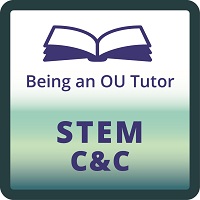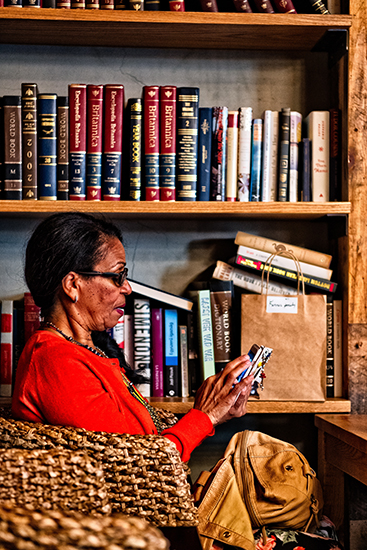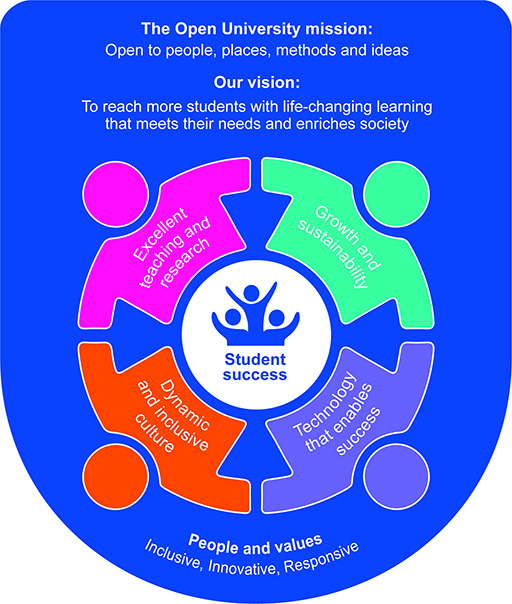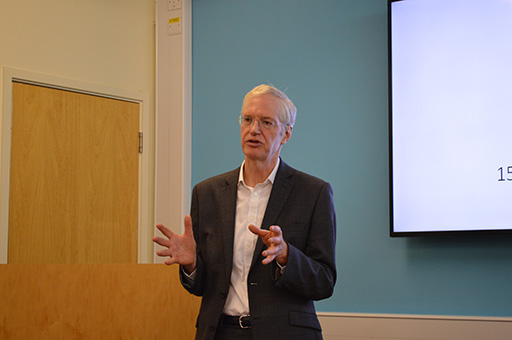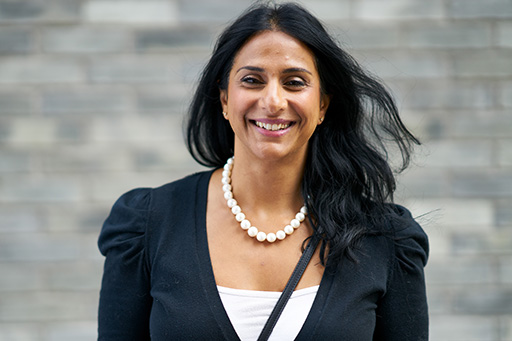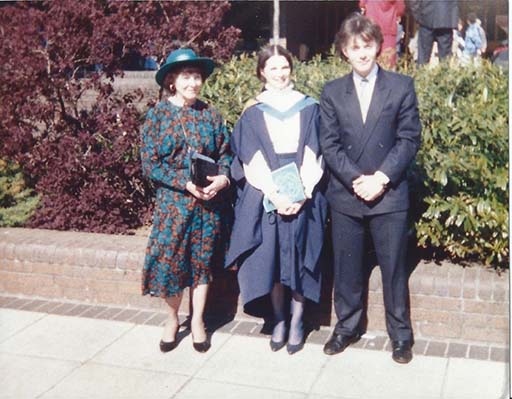Use 'Print preview' to check the number of pages and printer settings.
Print functionality varies between browsers.
Printable page generated Sunday, 22 February 2026, 10:56 PM
Introduction to the OU and the role
1.1 Introduction
By Ann Walshe (Ctrl + click to read the author's biography)
"I sometimes say to people 'have you ever thought of studying with the OU?'
"But just as often I ask, 'have you ever thought of teaching for the OU?”
The purpose of this course is to raise awareness of the Open University (OU) tutor role and help you decide if this is something you would like to apply for, and if you would find it rewarding. You may have experienced tutor roles in other institutions and wish to know how the OU role compares. We will give you an insight into what being a tutor at the OU entails, what you could gain in personal development and satisfaction, and how you could make a significant and positive difference to the lives of our students.
This course uses selected extracts and resources from the OU website that will help you understand the tutor role. If this course inspires you to apply to become a tutor for the OU, we hope that the insights you have gained from the course will help you when writing your application.
Course discussion forum
We encourage you to use the discussion forum as you progress through the course to tell us of your experience of learning about being an OU tutor. The forum will enable you to connect with others and share experiences together. You will be able to respond to, and reflect on, other learners' comments.
The forum is also your opportunity to connect with experienced OU STEM tutors and find out from them first-hand what it is like to be an OU tutor.
We offer some straightforward guidance on how to participate in our course forums to help you. This discussion forum is moderated by the OU course team.
Discussion forum 
Please tell us what you would like to get out of studying the course and share any questions you have about the learning journey ahead.
Post your thoughts to the discussion forum.
1.2 What is the OU?
The OU is the UK’s largest academic institution. Its royal charter was granted on 23 April 1969 and the OU celebrated its 50th birthday in 2019.
For the past fifty years, we’ve empowered over two million students across 157 countries to transform their lives through learning.
The OU main campus is in Milton Keynes and around 1200 full-time academics are based there.
Watch this video in which Ann guides you through an overview of the structure, history and achievements of The Open University.
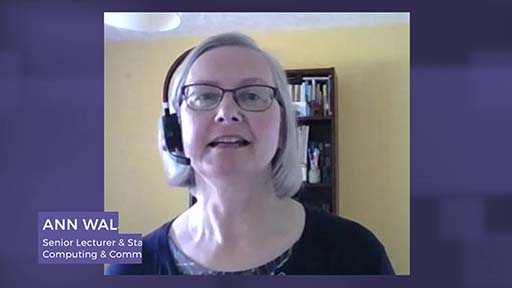
Transcript
At the heart of the OU’s teaching are its faculties, schools and institutes, producing high-quality courses underpinned by research of international excellence.
Schools belong to faculties.
STEM schools
The STEM schools are:
- School of Computing and Communications
- School of Mathematics and Statistics
- School of Engineering and Innovation
- School of Environment, Earth and Ecosystem Sciences
- School of Physical Sciences
- School of Life, Health and Chemical Sciences.
There are several institutes.
IET was established in 1970 to understand how we can help people learn and is a leading European research institute in the field of innovative education. It is part of the Faculty of Wellbeing, Education and Language Studies (WELS).
Established in 2004, CREET is an internationally recognised interdisciplinary centre of excellence for educational research. It is part of the Faculty of Wellbeing, Education and Language Studies (WELS).
KMi is a multidisciplinary R&D lab that has been at the forefront of innovation for the past 20 years. It is part of the Faculty of Science, Technology, Engineering and Mathematics (STEM).
1.3 Who are our students?
OU students are very diverse in age, previous educational qualifications and background, bringing a wealth of experience that enriches the student body. Our students are all part-time students, even though some may choose to study at full-time intensity. They are generally studying whilst juggling the demands of their busy lives. Students fit their study around their jobs, families and other commitments.
Our open admissions policy helps thousands of people who failed to achieve their potential earlier in life.
We are the largest provider of higher education for people with disabilities.
Did you know?
The OU has more disabled students than any other university in Europe. The flexible nature of OU study and our experience in harnessing enabling technologies to support learning means over 24,000 people with a wide range of disabilities – including mental health issues – choose to study with us each year.
Learn some facts about OU students by answering the five questions below.
a.
43%
b.
76%
c.
61%
d.
89%
The correct answer is b.
a.
8%
b.
12%
c.
23%
d.
19%
The correct answer is c.
a.
42%
b.
34%
c.
26%
d.
38%
The correct answer is b.
a.
14,264
b.
18,689
c.
21,472
d.
24,709
The correct answer is d.
a.
62%
b.
42%
c.
32%
d.
52%
The correct answer is c.
The OU is the only UK university dedicated to distance learning, which means our students are not based on campus, the exception being that many of our postgraduate research students are based at the Milton Keynes campus.
The unique OU model of distance teaching is called “supported open learning”. You will learn about how this works in Part 3 Teaching methods and technologies of this course.
Our students are supported by tutors, also called Associate Lecturers (ALs). Tutors are not based on campus. They work remotely across the UK. Tutors make a vital contribution to the quality of teaching and learning, and support students by making contact at key points in their study, marking and providing feedback on assignments, helping students understand the module material and helping them prepare for their examination or end of module assessment
An associated role is that of practice tutor. Practice tutors have a broader role in relation to professional programmes such as degree apprenticeships. They have a particular responsibility for supporting the workplace aspects of degree apprenticeship students.
You will learn more about the different tutor roles in Part 4 Teaching in Computing and Communications of this course.
The tutor is generally the ‘face of the OU’ to their students. They are the first person a student will contact if they need help with their study. They will provide one-to-one support to the students in their tutor group. Tutors also run group tutorials either face to face or online.
1.4 Ethos of the OU
The OU’s mission is to be open to people, places, methods and ideas. We promote educational opportunity and social justice by providing high-quality university education to all who wish to realise their ambitions and fulfil their potential. Our vision is to reach more students with life-changing learning that meets their needs and enriches society. In achieving our mission, we are committed to, and are guided by, the enduring OU values of inclusivity, innovation and responsiveness.
Inclusive:
- We play a unique role in society, making higher education open to all
- We promote social justice through the development of knowledge and skills.
Innovative:
- We lead the learning revolution, placing innovation at the heart of our teaching and research
- We continuously seek new and better ways to inspire and enable learning
- We create world-class research and teaching.
Responsive:
- We respond to the needs of individuals and employers and the communities in which they live and work
- We are dedicated to supporting our students' learning success.
We work in partnership with national and local organisations to open up higher education to underrepresented groups, reaching out to potential students in their communities – and ensuring that, once on board, these students receive the support they need to succeed in their studies.
The OU is more than just a place of learning - it is a community. The OU student charter, developed jointly by the University and the OU Students Association, sets out our responsibilities to one another as members of the OU community.
Addressing the AL Assembly* on 15th November 2019, the OU Vice-Chancellor, Tim Blackman, reasserted that the OU is a social movement as much as it is a university.
“We ripple out across British society and across the world in terms of what our mission is and what we’re about. So, we are a movement and we’re a movement for change.” With technology affecting every job, there is a need for lifelong learning.
While the traditional degree remains the university’s prime role, the OU needs to diversify to respond to changes in the labour market driven by every part of the world becoming a knowledge economy. The OU is unique among UK universities in having a responsibility in its charter to serve the educational well-being of the community at large.
“Humans are natural-born learners. We have evolved to learn, wired to learn. We need to learn as much as we need to breathe, eat, drink. It’s fundamental to our humanity.”
*The AL Assembly
The AL Assembly represents ALs, i.e. tutors, on appropriate university committees and groups. Through representation, tutors can be involved and consulted and can contribute to policy and strategy around enhancing the student experience.
Activity 1 
You have now learned more about the OU, its students and its ethos.
Did anything surprise you? Has it changed your view about The Open University at all?
Post your thoughts to the discussion forum.
1.5 Who are our tutors?
Our tutors come from diverse backgrounds and have different motivations to become a tutor:
- You may be a postgraduate student or a postdoctoral researcher looking for teaching experience
- You could be a recent OU graduate looking for teaching experience or looking to give back something to the OU
- You might be a Further Education teacher wanting to branch out into distance teaching by correspondence in Higher Education
- You may be a technical professional progressing in your computing or IT career, wanting to give something back to the community by teaching the next generation of computing and IT professionals
- You can even make being an OU tutor your career.
Being an OU tutor is flexible and family-friendly because tutors are mainly teaching at a distance and they can manage their own working pattern. This means that the role would also suit carers and returners to work or end-of-career professionals seeking a retirement role.
Tutors are typically given a lot of freedom in how to manage their time best to support their students. This allows for the fact that the different regions and nations of the UK are very different and that students studying at the OU often have different expectations and needs from their education.
This is what some tutors have said about the job. Note that they use the terms “tutor” and “AL” (Associate Lecturer) interchangeably:
"OU teaching is so different from what I do by day, it is almost addictive. The thrill you have when a student has grasped what you have said in a tutorial, and you see it come back to you in an assignment - you know you really have imparted more than just the text, but a real understanding which can be applied to everyday life."
“Being an AL brings flexibility to my life. There are times when I am busy and must concentrate on the matters at hand, but there are plenty of others where I can be free and mobile if I wish. I don't have to work from home all the time, with a laptop and the right setup I can be free as a bird. Organisation is up to me, the motivations come from within, teaching is good and there are plenty of examples where I can see that I have made a genuine difference to people's lives.
As an AL I teach a broad church in my field, and I get a chance to see students develop as they progress. Colleagues are invariably helpful and friendly, a shared approach to teaching informs practice, and makes us part of a community. I love not having to commute and the feeling that instead of my life being controlled by the clock, I can make choices about how and where I work.”
"It is a marvellous job for someone who is disabled. The OU is very open access to ALs as well as students. At first, when I was trying to build up my private tuition from home, the OU work I had was my anchor, it gave me stability. Also, the OU gets quite a lot of disabled students, and I think it must be good for them to see a disabled tutor."
Throughout this course you will watch several videos of OU tutors discussing their roles and the various aspects of being an OU tutor.
In this first video, Chris, Tammy, Charly, Prince, Joan and Colin introduce themselves and say a little bit about their background.

Transcript
Tutor support
Tutors support their students in two ways:
- Academically, helping them understand and learn the module material.
- Pastorally, helping them develop their organisational and study skills.
1.6 What do you need for the role?
To be a tutor you should have a degree or equivalent, or a professional or vocational qualification in the subject area you wish to teach. You should also be able to use information and communication technology in supporting students and have good communication skills.
You need to be:
- Approachable
- Non-judgemental
- Organised
- Able to work independently and as a member of a tutor team
- Able to work with students from different backgrounds including those with disabilities
- Able to understand how students from different backgrounds might feel about being a learner
- Able to appreciate how students learn and the importance of study skills
- Able to listen constructively and offer reflection and open-ended questions
- Honest about what you can or can’t do while being sufficiently prepared so that students can have confidence in you
- Committed to equal opportunities policies and practices
- Open and accepting of other people’s values and ways of thinking. You will meet a wide variety of students and colleagues from diverse educational, cultural and work backgrounds and we welcome diversity in our tutors.
Activity 2 
Think about your own motivation for studying this course.
What aspect of the tutor role interests you? Reflect on the qualities you can bring to the role and why those qualities are important.
Make some notes in the text box below.
1.7 What are the rewards of the role?
Few roles are more rewarding and fascinating than that of an OU tutor. If you become a tutor you will be able to make a fundamental difference to your students who are studying amidst many other commitments and challenges and who may have previously struggled with study. You will also meet a diverse range of students bringing their various knowledge and experiences and you will often learn from them. You will meet and work with other tutors and be part of a supportive community of learning.
Many of our students are studying in the context of a difficult environment. They could be working in the Services, they could have caring commitments, they could have health problems and be frequently in hospital. The OU provides many resources to support tutors when working with students. It is most rewarding to know you have helped your students succeed.
This is one student’s testimonial:
“I've always loved studying but being the main carer for my father-in-law meant that going to a conventional university was out of the question. When I heard about the OU, I decided to find out more as the idea of distance learning appealed to me.
"I took a break from study after giving birth to my youngest child and returned the year after as I wanted to complete what I'd started; the OU's support and positive attitude were additional motivators. My tutors throughout were helpful, supportive and encouraging.
"Achieving my OU degree has had huge benefits. My knowledge has increased significantly and the whole process of studying has given me more motivation to research and explore other subjects. My personality has also changed; I'm now a more confident communicator and am not afraid to sit exams!
"I often recommend the OU to others. It's the best place to study, especially if you have other commitments. It's flexible and you can choose whatever suits you and your commitments.”
The main reason we are called the Open University is that we are open to everyone and this includes students in prison. Although it is a small percentage of our student population, the OU has approximately 1800 students in over 150 prisons. Tutor Nigel Gibson says, “Working with students in secure environments, we work with the student, not their offence.”
The late Keith Jessop, an Offender Learner Coordinator, once said: ‘For prison students, the OU tutor is about the future. This is one of the few people a prison student meets who has nothing to do with the past’. The first recipient of the Keith Jessop Memorial Award wrote a short piece, which very powerfully captures the significance of OU study:
“Having left school at 16 with few qualifications I never thought I would study at university level. That is until I was introduced to The Open University. Studying with the OU has opened my eyes to the opportunities that are available to me. No longer do I think of myself as only able to do menial jobs.
"In fact, I am only limited by my own self-belief in what I am capable of. My self-confidence has risen since I have started studying. Each time I get the results back from a tutor-marked assignment with 85 or 90, plus the tutor’s comments on how well I have done, I feel proud of my achievements. Even though they may only be small steps in the journey of life, they are steps in the right direction.
"Studying with the OU has given me an insight into my future, one where I can make a success of myself. A future where my family and friends can be proud of me. But most of all one where I have the feeling of accomplishment and self-worth.”
Accessibility is at the forefront of the OU's mission to be 'open to all'. If a student has a long-term health condition, a specific learning difficulty (such as dyslexia), or a mental health difficulty, then, along with other disabilities, the OU considers they are entitled to reasonable adjustments to support their study. Tutors are ideally placed to help with those adjustments. One student wrote:
“I cannot read anything on a white background, so I don’t read books and cannot attend either face-to-face or online tutorials if the PowerPoints are on white backgrounds. I have yet to meet a tutor who hasn’t either sent me the materials beforehand, so my computer or laptop could make the necessary adjustments or changed the background colour themselves. Without those adjustments, I wouldn’t be able to attend tutorials and I really value them.”
Here are some more quotes from tutors:
"I really like the teaching. OU students - as opposed to younger undergraduates - have worked very hard to get to where they are, so they really appreciate the fact that they are able to study. They are so keen. You could not ask for anything better."
"I love the feeling you get when a student realises 'I can do it' and there is a sudden explosion of confidence."
"I prefer teaching adults, because they bring so much to you. They come from everywhere, all walks of life, jobs, ages, and with different experiences. It is very enriching."
A special opportunity for tutors to see the difference that they can make to students is to attend a graduation ceremony. Ceremonies are held across the UK. Depending on which modules they tutor, they may not see their students, but they will be inspired and uplifted by the experience of attending a graduation ceremony and hearing students’ success stories. Tutors can be part of the formal procession and platform party to help our graduates celebrate their success.
Tutors have opportunities for Continuing Professional Development. The skills they develop can be applied to other professional roles they may have. We provide Staff Development events and offer fee waivers to study OU modules. We encourage tutors to gain Higher Education Academy accreditation through our own free scheme.
1.8 Making the difference
The OU changes people’s lives. Tutors play an important role in making a difference to our students’ success.
Christine’s story describes how the OU made a difference to her when she was a student and how she is now an OU tutor making a difference to others.
Christine’s story: the student becomes the teacher
Christine Thelma Newton started her OU degree in 1978 as a way to cope with depression. Over forty years later, graduate-turned-tutor Christine has spent the past decade proudly watching her students achieve their dreams.
“I started studying an Arts Foundation Course in 1978 after suffering acute depression,” says Christine. “This was suggested by a Methodist Minister friend who had completed a degree with The Open University. It was the start of a surprising journey for me.”
Christine began by studying art history for the first time and went on to explore several modules, including 19th century literature, Shakespeare and poetry.
“I married in 1980 and each year my husband would ask, ‘What are we studying this year?’ My course fees were one of the first things we budgeted for. While studying we went to Florence and Rome together and saw the wonderful paintings, sculpture and architecture.”
The start of something special
In 1990, after 12 years of part-time study and hard work, Christine collected her degree in a ceremony at Newcastle City Hall, while her parents, mother-in-law and husband watched with pride.
Though Christine was already working as a qualified and experienced nurse, midwife and health visitor, she found a new vocation in teaching childcare at a local college where she used her experience to inspire a new generation of early years practitioners.
In 2010, Christine would receive another recommendation from a colleague that would take her life in a new direction, as she explains:
“An External Examiner who was an Open University tutor suggested I had the ability to write clear feedback to my students. With his support and encouragement, I applied to teach at the OU and would go onto teach K319 Adulthood, Ageing and the Life Course. I still cannot believe I was appointed!”
Supporting the next generation of learners
As an Associate Lecturer with The Open University, Christine teaches and supports OU students from all over the world, a role which she describes as her ‘joy and privilege’.
“I am grateful for all the opportunities and support from colleagues I have found here. The Open University has helped me work through depression, taught me to appreciate art and architecture, renewed my love of English Literature and provided exciting challenges as a teacher.”
“When we celebrated the 50th Anniversary this year, I do not think anyone was prouder or more thankful than myself.”
In September 2019, Christine returned to the ceremony platform nearly thirty years since she graduated. This time, as part of the procession at the Glasgow ceremony, where she watched and applauded as two of her OU students collected their first-class honours degree.
“The OU provides second chances for individuals to learn and achieve,” says Christine, “and I am proud to be one of the two million students.”
1.9 Summary
In Part 1 of this course, we have introduced you to The Open University, its main campus in Milton Keynes and its offices across the UK. You have learned about the faculties, schools and institutes that are at the heart of the OU’s teaching, as well as gaining an insight into our students, our mission and our ethos.
In addition, we have given you an overview of the OU tutor role and the qualities you need to be a tutor. We hope you feel inspired by what some of our tutors have said about being a tutor and the rewards of the role.
Finally, reading Christine’s story, you saw how the OU and its tutors play an important role in making a difference to our students’ success.
Now go to Part 2 of the course, Teaching approach, where you are introduced to the many aspects of the tutor role and the teaching materials.
Acknowledgements
Grateful acknowledgement is made to the following sources:
Every effort has been made to contact copyright holders. If any have been inadvertently overlooked the publishers will be pleased to make the necessary arrangements at the first opportunity.
Important: *** against any of the acknowledgements below means that the wording has been dictated by the rights holder/publisher, and cannot be changed.
Except for third party materials and otherwise stated (see terms and conditions), this content is made available under a Creative Commons Attribution-NonCommercial-ShareAlike 4.0 Licence.
The material acknowledged below is Proprietary and used under licence (not subject to Creative Commons Licence). Grateful acknowledgement is made to the following sources for permission to reproduce material in this free course:
Acknowledgements for Part 1
Part 1 Video: Happy Birthday OU: 50 Years of the Open University, 25 April 2019, BBC4. © BBC
Part 1 Video: Footage from Harold Wilson's 'University of the Air' speech given at the Labour Party Conference in 1963.
Part 1 banner_image: Chris Floyd
OU STEM faculty image: Publisher Unknown
Group: © Rawpixel Ltd / iStock / Getty Images Plus
Elderly woman on mobile: Photo by Malcolm Lightbody on Unsplash
Tim Blackman talks to AL Assembly: Tony Jones
Group 2: © Djomas / Shutterstock
Flexible_working: © Vitaliy Vodolazskyy / 123 Royalty Free
Christine Thelma Newton: Christine Newton
Open_books: agentry / iStock / Getty Images Plus
Don't miss out
If reading this text has inspired you to learn more, you may be interested in joining the millions of people who discover our free learning resources and qualifications by visiting The Open University – www.open.edu/ openlearn/ free-courses.

